
Recent Photograph

Signature
"My life is a hesitation before birth." — Franz
Kafka, Diaries
Biography
VITAL STATS
(Please print clearly.)
| Name: | Franz Kafka |
| Sex: | Male |
| Height: | 6 feet (1.82 m) |
| Weight: | Between 140 and 100 lbs. (65-45 kg.)
(Fluctuated due to illness) |
| Color of eyes: | Gray-blue |
| Color of hair: | Black |
| Nationality: | Austro-Hungarian, then Czech |
| Religion: | Jewish |
| Date of Birth: | 3 July 1883 |
| Place of Birth: | Prague, Bohemia |
| Parents: | Hermann Kafka(1852-1931)
Julie (Löwy) Kafka (1856-1934) |
| Siblings: | Eldest of 4 surviving
Georg (1885-1886) Heinrich (1887-1888) Gabriele "Elli" (1889-1942?) Valerie "Valli" (1890-1942?) Ottilie "Ottla" (1892-1943) |
| Education: | Doctor of Law at Charles Ferdinand
University, Prague, 1906 |
| Occupation: | Insurance worker, writer |
| Spouse: | None |
| Children: | None (but see Chapter 5 below) |
| Date of Death: | 3 June 1924 |
| Place of Death: | Kierling near Vienna, Austria |
| Cause of Death: | Tuberculosis |
| Age at Death: | 40 years, 11 months |

Recent Photograph

Signature
Enough bureaucratic chitchat—let's see what's behind the statistics.
Chapter 1: Birth and childhood
 |
|
|
Two years later, another son, Georg, was born, but died a year later. Another son, Heinrich, was born in 1887, but also died less than a year later. The effect of this on Franz is difficult to assess. He later stated that the deaths were preventable, due to doctor's errors. Nevertheless, on September 22, 1889 the first of his sisters, Gabriele "Elli", was born, followed by Valerie "Valli" on September 25, 1890, and Ottilie "Ottla" on October 29, 1892. The children were brought up mostly by governesses, a common practice among the middle and upper classes of the time. The family moved from apartment to apartment as their financial situation improved, owing to the success of the store. Young Franz was quiet and withdrawn. However, he liked to write plays for his sisters to put on in their spare time, and was a voracious reader.
Chapter 2: Education, or "German literature—may it roast in hell." — Kafka letter, 1902
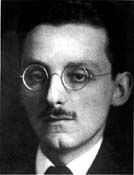 |
|
|
Chapter 3: The Hermann & Co. Asbestos Factory, or Early Adulthood
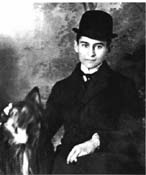 |
|
|
Max Brod convinced Kafka to publish some of his work, and in January 1913 Meditation, a collection of some early short stories and sketches, appeared. In the meantime he was gathering information for his "American novel," which he began writing in 1912.
Throughout his college days and well into adulthood, Franz was definitely not living the life of a monk. He had numerous affairs and one-night stands with barmaids, waitresses, and shopgirls, not to mention his visits to the whorehouses, activities that most men in Prague at the time also indulged in. However, these relations with women were entirely sexual. They didn't mean anything to him beyond immediate sexual gratification.
The most bizarre aspect of his sex life, though, was that sex was absolutely repulsive and disgusting to him. Hence, the very idea of "normal married life" with a respectable woman was too much for him. "Coitus as the punishment for the happiness of being together," he wrote in his diary, when faced with the prospect of marriage and what that would entail. He would time and again break off engagements, sometimes nearly at the last minute, in order to escape it. Franz seems to have suffered from the malady common to many at that place and time: namely, the virgin/whore complex, where every woman is either a "nice girl" or a slut, with no room in between. So a normal, adult affair with a woman he liked and respected would prove all but impossible, as Felice Bauer soon found out.
Chapter 4: Felice
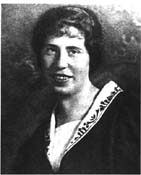 |
|
|
During this time, in September 1913 he went to a sanatorium in Riva, Italy for his health, which had never been extrordinarily good, and there met an 18-year-old Swiss girl, Gerti Wasner, whom he liked very much. He would do cute things like knock on the ceiling (their rooms were directly on top of each other) and go to the window to talk to her at night, or write fairy tales to read her over breakfast. Although this affair only lasted the ten days they were there together, it seems to have made a deep impression on him.
Meanwhile the courship by letter of Felice continued. He would write her every day, sometimes even more often, frequently complaining about how bad or dirty he was, but confident that she would listen to it all. Eventually he proposed to her in 1913, and she accepted, although in the same letter Franz wrote asking her he also went on and on as to why he would be bad for her.
Felice had a friend, Grete Bloch, born 1892, who also began writing to Franz. She acted as an intermediary between Franz and Felice; Franz would write to her about some of his problems with Felice, and she would try to help. They wrote each other many letters and built up a kind of friendship. Grete wanted more, though—she seems to have wanted Franz all to herself.
Chapter 5: PRAGUE WRITER IN PATERNITY SUIT SHOCKER!
 |
|
|
Frankly, I think this whole episode is tabloid material. I tend to doubt it myself. For one thing, the only source for it is Grete Bloch herself, in a letter written to a friend 25 years after the fact, in 1940, which Max Brod got ahold of from a friend and printed in the second revised edition of his Kafka biography. She says she had a little boy in 1914 that died at the age of seven, in 1921. There is no other concrete evidence for any of this, and Grete said that Franz knew nothing about the child, which seems to be a little unbelievable, since they did in fact keep in contact for a couple of years after. In fact, when Franz, Felice, and Grete met again seven or eight months later, it should be noted that nobody seemed to notice anything amiss! Grete apparently became a bit enamored of him, whom, we must note, she admired fervently. Wishful thinking, perhaps? Also, it's hard to believe Kafka, who was deathly afraid of sex anyway and who wrote pages and pages of letters to Felice about why he couldn't bring himself to do the nasty with her, would then go after her friend. Franz was, after all, virtually incapable of a "normal" sexual affair with a "nice girl" like Grete, owing to his rather neurotic attitude towards sex. Unfortunately, we can't ask Grete more about it, since she was beaten to death by the Nazis in 1944. The conclusion? There's no way to know for certain, although probably not.
Chapter 6: The Trial, or Tuberculosis Takes its Toll
August 2 — "Germany has declared war on Russia. Swimming in
the afternoon." — Diary, 1914
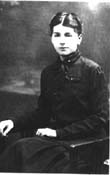 |
|
|
Although Franz proposed again to Felice in July 1917 after actually spending a week with her at Marienbad, and later taking a trip with her to Budapest, he began coughing up blood and in August was diagnos ed with tuberculosis. Always fearful of marriage and sex, this spelled the end of his relationship with Felice, who had had about enough of his crap. She married another man in 1919 but kept his letters.
After the diagnosis of his tuberculosis, he went to stay with his favorite sister, Ottla, in Zürau, northwest of Prague, which was peaceful, healthy, and most of all for the hypersensitive-to-noise Kafka, quiet. Here he wrote what would become The Blue Octavo Notebooks, a collection of proverbs, thoughts and sketches. After eight months of what he later termed the happiest period in his life, he returned to Prague.
Despite his failing health, he became engaged again, this time to Julie Whoryzek (1891-1939), the daughter of a synagogue janitor and shoemaker, in 1919, causing his father to go on and on about how he would have to sell the store and emigrate to escape the shame to the family name caused by this union, one of the reasons he would write the confessional, lacerating Letter to His Father that same year. (Incidentally, his father never saw this letter. Franz gave it to his mother so that she would give to him, but after looking at it she thought better of it.) Nevertheless, Franz went so far as to pick out an apartment for him and Julie and came within a couple of days of the wedding before breaking it off. A new person had come into his life.
Chapter 7: Milena
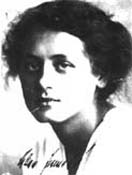 |
|
|
Chapter 8: Dora
"Ev'ry morning, ev'ry evening, Ain't we got fun?/ Not much money,
oh but honey, ain't we got fun?" — 1921
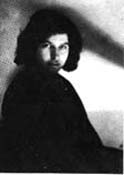 |
|
|
Chapter 9: "My love, my love, my good one!"
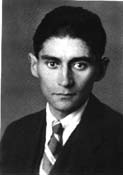 |
|
|
Dora was inconsolable. "My love, my love, my good one!" she went around crying (which always breaks my heart and brings a tear to my eye). The funeral was held on June 10th at the Jewish Cemetery in Prague.
Chapter 10: Epilogue
Franz's dad and mom lived until 1931 and 1934, respecively. They were buried in the same plot he was.
His sisters did not meet so kind a fate. During World War II, Elli and Valli and their families were shipped off to the Lodz ghetto, and apparently died in the uprisings there or were sent to death camps. Ottla separated from her Gentile husband, Josef David, since she felt she had no right to avoid the suffering of her people, and was sent to the Theresienstadt (Terezin) concentration camp in northwestern Bohemia. She volunteered, in 1943, to help accompany a trainload of children somewhere, which turned out to be Auschwitz. Here's the entry in Auschwitz Chronicle 1939-1945 by Danuta Czech:
7 October [1943]
1,260 Jewish children and their 53 care givers are transferred from Theresienstadt
in an
RSHA transport. They are killed the same day in the gas chambers.
Felice Bauer moved after her marriage to Switzerland and later, in 1936, to New York. She was widowed in 1937 and later started her own business. Shocken Books offered to buy the letters from Franz to her in the 50s, but she refused. Finally she gave in and sold them for $5,000. She needed the money, mostly due to her failing health. She died in 1960, leaving a son and a daughter.
Milena Jesenská remained a fierce devotee of Franz, writing a lengthy obituary for him and becoming his Czech translator. She eventually divorced Pollak, remarried, had a daughter, Jana, and divorced again. She worked to improve the situation of the Jews, who were starting to be persecuted by the Nazis. She was sent to the Ravensbrück concentration camp for this, where Margarete Büber-Neumann met her and was impressed enough to eventually write a book about her Kafkas Freundin Milena, translated into English with the ridiculous title, Mistress to Kafka, (now available as Milena, The Tragic Story of Kafka's Great Love). Milena died from kidney failure there on May 17, 1944. Her daughter wrote a book about her mother in 1968 and was killed in a car wreck in 1981. For more information about Milena, see my Milena Jesenská tribute page.
Dora Diamant never really got over Franz's death. She eventually married and had a daughter, only to have her husband deported by the Nazis and never heard from again. She sometimes talked about Franz, awestruck and quite possesive, calling herself Dora Kafka and complaining that his instructions to burn his works should have been carried out. She moved to London with her daughter, where she died August 15, 1952. Her daughter Marianne died in 1982.
Max Brod didn't carry out his friend's instructions to burn his works, of course (or you wouldn't be here looking at this page). He edited and had published virtually everything Franz wrote. In 1939 he moved to Tel Aviv in Palestine, taking with him almost all of Kafka's manuscripts, in order to avoid the Nazis, where he lived until his death in 1968, with a reputation as either the man who saved Kafka for the world or as the man who disregarded his friend's dying wishes.
Franz Kafka has become an icon of sorts, emblematic of modern times. His popularity increased exponentially after the publication of his stories in the 20s and 30s, especially in the English translations done by the Muirs. He is now an institution, his own adjective. About ten years ago, somebody bought the manuscript of The Trial for close to two million dollars. Not quite as good as Stephen King or John Grisham, but not bad for an uncompleted manuscript meant for the flames. (Just imagine the royalties!) Few writers have had such an effect on their times as he has.
This biographical sketch was written by yours truly.
A real weeper, I think—sniff.
Back
to Leni's Franz Kafka Page / Milena Tribute /
Kafka and Judaism / Texts / Summaries
/ Books / Pictures /
Kafka at the Movies / Views
on Kafka / Fun with Kafka / Lecture
on "The Metamorphosis" / Links